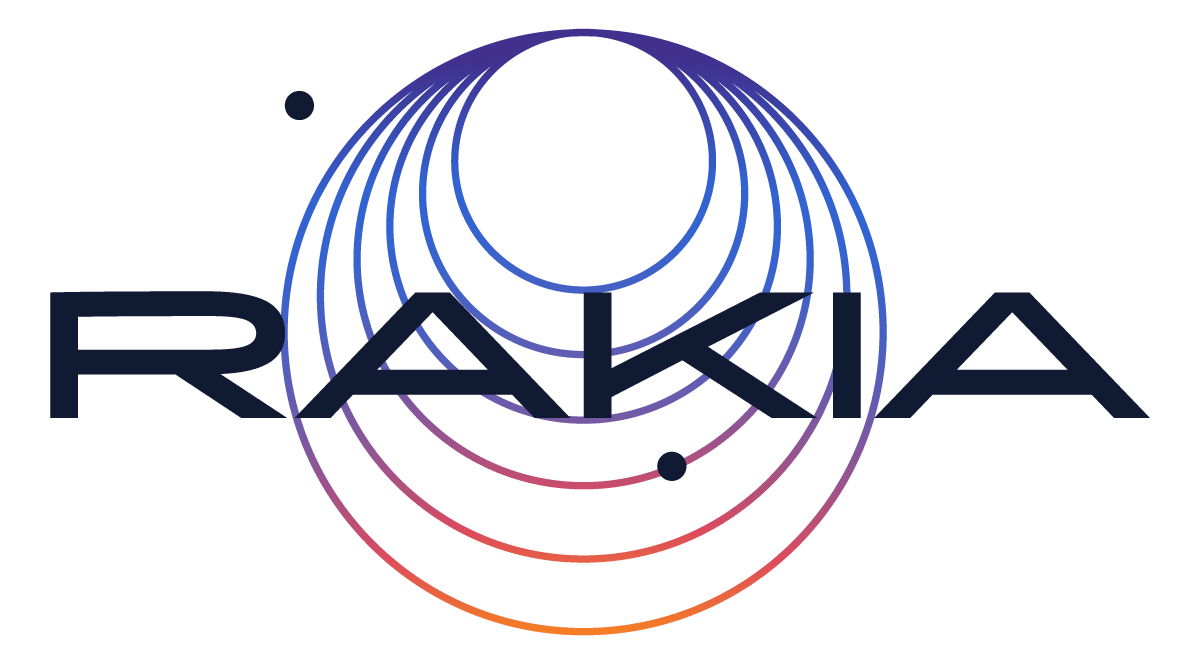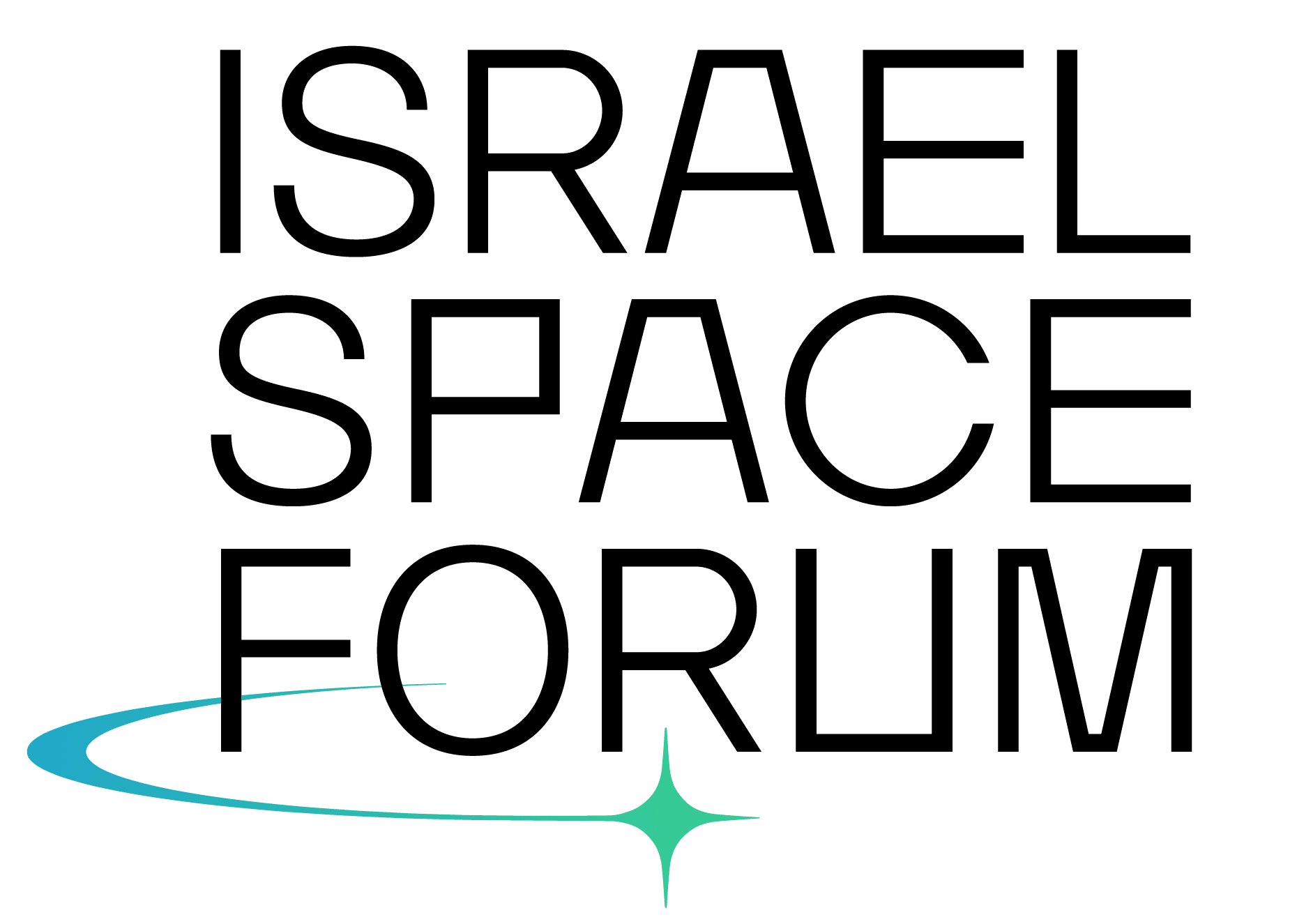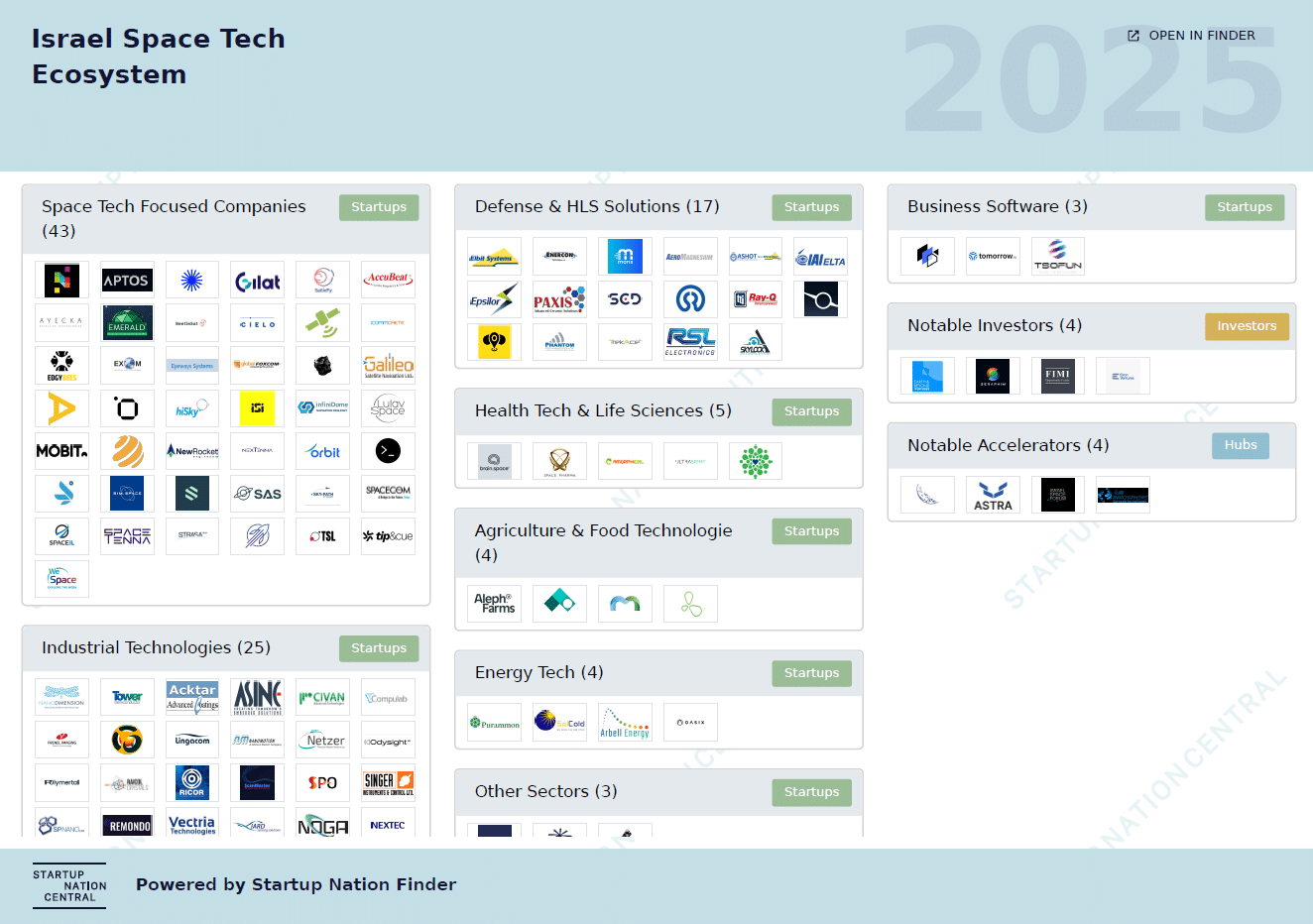Space Tech Innovation in Israel
A Startup Nation Finder & Israel Space Forum Spotlight






Overview
Israel has emerged as a dynamic force in the global space tech ecosystem, driven by its comprehensive independent capabilities. From satellite design and manufacturing to launches, space system management, ground station operations, and payload development, Israel’s expertise spans the entire satellite lifecycle.
The rise of NewSpace—characterized by the increasing role of private companies in driving innovation and commercial opportunities in space—has transformed the global space economy. Unlike traditional space activities that rely heavily on government funding, NewSpace leverages private investment and novel business models to develop affordable, scalable technologies such as small satellite constellations and commercial launch systems. This paradigm shift has not only accelerated technological advancements but also unlocked new market opportunities, creating a thriving space economy projected to reach $1 trillion globally by 2040¹.
These advancements, developed initially for defense and strategic needs, have evolved into diverse applications for civilian use, laying the foundation for a thriving space tech industry. Notably, these capabilities are now being harnessed to address critical global challenges, including climate change. Israeli satellites and their payloads are actively contributing to Earth observation, climate modeling, and environmental monitoring, providing invaluable data to better understand and combat the effects of global warming.
By leveraging its deep technical knowledge and multidisciplinary innovation, Israel has cultivated a vibrant ecosystem of startups and established companies. This ecosystem is delivering cutting-edge solutions in areas such as satellite communication, Earth observation, climate resilience, and space exploration, making Israel a key player in addressing global challenges through NewSpace technology.
According to Startup Nation Finder’s database, the sector in Israel is still relatively small, with only 104 tech companies that either focus primarily on space tech or related technologies that can develop space related applications. These companies raised $700 million in the past five years.
Launching Israel’s NewSpace Era: Unlocking the Potential

Eli Barda, Senior Hitech Partner and Market Leader, EY
The Israeli NewSpace ecosystem, while relatively small compared to global leaders like the United States, China, and the European Union, can be a significant player in key niche areas of space innovation. Israel’s strength lies in its ability to produce innovating technologies with a lean, efficiency-driven approach. SpaceIL, for example, has gained international recognition for projects like the Beresheet lunar mission, highlighting the nation’s ability to punch above its weight.
NewSpace in Israel has yet to generate the growth and momentum seen in other tech sectors, revealing untapped potential. The sector has made progress and gained traction, but its current scale is characteristic of an early-stage, underdeveloped market, with an average of less than ten significant new startups established annually. The recent events in the region, which would normally present a setback for most economies, represents an opportunity for growth for the sector.
The growing interest from investors in the Israeli defense sector over the past months represents a promising opportunity to reinvigorate Israel’s NewSpace ecosystem. Moreover, dual-use startups, those developing technologies with both civilian and defense applications, have exciting potential to broaden market opportunities significantly and attract new investors to the sector.
Despite being in its early stages compared to other, more mature Israeli high-tech sectors, Israel’s NewSpace ecosystem has already demonstrated substantial growth and achievements. The sector features several notable mergers and acquisitions, alongside a dozen publicly traded companies such as Gilat Satellite Networks, ImageSat, Maris-Tech and SatixFy. Additionally, local prime companies like Elbit Systems, Rafael, and Israel Aerospace Industries (IAI) play a significant role in the ecosystem’s development.
Furthermore, the ecosystem is attracting increasing interest from large foreign multinational primes, drawn by Israel’s unique technological offerings and innovation. Several Israeli startups have successfully raised significant venture capital, underscoring the sector’s potential. Notable examples include Tomorrow.io, which specializes in weather intelligence; Ramon.Space, a leader in space-resilient computing solutions; 4M Analytics, which focuses on geospatial data infrastructure; and Exodigo, a pioneer in underground mapping and imaging.
These elements lay the foundation required for a lively ecosystem and essential talent pool, setting the stage for the market’s next leap forward and providing a strong future growth. The density of talent in aerospace and technology, derived from Israel’s unmatched military expertise and experience, sets Israel apart from the rest of the world and serves as a significant growth driver.
There is also an opportunity here for the government to extend its support to the sector’s growth. Pushing forward key initiatives could include increased funding for academic institutions and early-stage R&D startups, fostering partnerships with global space agencies and multinational organizations, creating a supportive regulatory environment, and strengthening infrastructure by building advanced testing facilities and production capabilities.
The above conditions are reminiscent of the days before Israel became a cyber nation over a decade ago, when there were extraordinarily high levels of technology and sophistication, significant governmental and military investment in development, and the acceleration of technologies that could only be tested locally. With sustained investment and strategic support, Israel has the potential to transform NewSpace into a thriving, globally competitive sector, achieving leadership akin to its successes in fintech, smart mobility, and cybersecurity.
Space Tech Startups
Israeli startups are redefining space innovation across key areas. From satellite communication and Earth monitoring to advanced infrastructure and exploration technologies, these companies are creating practical solutions with global impact. Whether it’s enabling secure connectivity, tracking environmental changes, or designing tools for space missions, Israel’s space tech sector is shaping the future of exploration.
Israeli Space Tech - Companies and Funding by Domain
Startups specializing in Space Tech encompass several domains:
1. Communication and Navigation
These startups develop technologies for satellite communications, navigation systems, and other related technologies. Over 50% of the startups specializing in Space Tech are focused on this domain.
BeetleSat: Developing a Low Earth Orbit (LEO) satellite constellation to provide global, secure, and high-quality Ka-band connectivity for various sectors, including mobile network operators, military satellite communications, aviation, maritime, and enterprise services.
Spacecom: Operates the AMOS satellite fleet, providing satellite communication services globally.
Galileo Satellite Navigation (GSN): Specializing in developing innovative GNSS/GPS products and solutions for the expanding civil market.
2. Earth Observation
These startups use satellites and other remote sensing technologies to collect and analyze data about the Earth’s surface and atmosphere. These startups account for 20% of the startups specializing in Space Tech but for 40% of the total funding.
- Climate Eyes: Utilizes satellite imagery analysis to monitor global water resources, providing real-time insights for effective water management without the need for on-site presence.
- Momentick: Provides Earth observation solutions that utilize satellite data to monitor and reduce greenhouse gas emissions.
3. Space Component and infrastructure
These startups develop and manufacture components and infrastructure for satellites and other space vehicles.
- Ramon.Space: Specializes in advanced space infrastructure and components, providing high-performance onboard computing solutions for space exploration and mission-critical applications.
- Tehiru: Focus on hybrid rocket propulsion systems, supporting space infrastructure and reusable components for small satellite launches.
- Netzer Precision: Develops high-precision encoders that are integral to space components and infrastructure, enabling accurate motion control and positioning for satellites and space systems.
4. Space Exploration
These startups focus on developing technologies for space exploration missions, such as rovers, landers, and space habitats. This is a small segment with only 5 companies currently developing Space Exploration technologies.
- Exom: Specializes in designing sustainable, eco-friendly habitat solutions for extreme environments, focusing on human settlements on the Moon and Mars.
- WeSpace Technologies: Developing autonomous robotic systems for lunar exploration, providing infrastructure and exploration solutions for accessing challenging surfaces on the Moon
Israeli Space Tech Companies - Funding Stage
The vast majority of the Space tech companies (59%) are early stage companies . However there are also some established mature private companies (18%) as well as several public companies.
Notable Israeli Space Tech Companies

ACCESS A FULL LIST OF SPACE TECHNOLOGY COMPANIES ON FINDER
Israel Space Highlights at the International Astronautical Conference

Melody Korman, Executive Director, Israel Space Forum [Rakia Mission]
The International Astronautical Congress (IAC) 2024 in Milan, themed “Responsible Space for Sustainability,” was a landmark event that attracted over 14,700 attendees from 120 countries and showcased innovations from over 530 companies.
For the first time, the Israel Space Forum, in collaboration with the Israel Space Agency and the Israel Export Institute, organized the Israeli National Pavilion. This pavilion served as a hub for Israeli startups, researchers, and industry leaders to present their cutting-edge technologies on a global stage and foster international partnerships.
The pavilion hosted the largest-ever Israeli delegation to IAC, with 90 participants and 19 Israeli talks featured in the official program. More than 60 international delegations visited the pavilion for meetings with Israeli companies. Among the participants were Acktar, Asterra, brain.space, Elbit Systems, Erdinast Ben Nathan Toledano – EBN, ISI, IAI, Netzer, NSLComm, Orbit, RAFAEL, Sim.Space, SpaceIL, STEMRAD, the Ramon Foundation, and leading academic institutions such as the Technion and Tel Aviv University.
Startups with Space-related applications
Beyond the core space tech sector, Israel’s ecosystem includes startups developing technologies across industries like Industrial Technologies, Defense Tech, and Health Tech, with strong potential for space applications. These innovations include advanced materials for spacecraft, satellite protection systems, predictive maintenance tools, and health monitoring technologies for astronauts.
By leveraging cross-sector expertise in the following sectors, Israeli innovators are accelerating advancements that can enhance safety, efficiency, and sustainability in space exploration.
1. Industrial Technologies
Used to develop new materials and manufacturing processes for space vehicles, this is the most dominant sector including 40% of the tech companies developing space applications.
- Polymertal develops advanced hybrid materials combining metals and polymers, providing lightweight, high-strength solutions designed for space exploration, such as high-temperature seals and EMI shielding for spacecraft components
- Noga 3d: Specializes in developing cutting-edge high-performance polymer (HPP) formulations engineered to excel in demanding environments such as space, aviation, automotive and more.
- Odysight.ai: Provides AI-powered predictive maintenance and monitoring solutions, integrating advanced micro-camera technology for aerospace applications, including support for NASA’s aeronautical flight testing.
2. Defense Technologies
Used to develop systems for protecting satellites and other space assets. Defense Tech is a natural adjacent sector responsible for 31% of the startups with space related applications.
- TTI Ray-Q Interconnect provides advanced high-speed interconnect solutions for defense and aerospace applications, offering critical components for satellite communications and space systems requiring reliable data transmission.
finder.startupnationcentral.orgfinder.startupnationcentral.org
3. Agriculture and Food Technologies
Used to develop new ways to grow crops and produce food in space. Companies in this industry make up only 7% of the companies that develop space related applications but account for 26% of the total funding.
- GREENONIX: Specializes in sustainable agriculture solutions and made history by sending duckweed-based products into space for growth experiments aboard SpaceX CRS-29.
4. Health Technologies
Used to develop new medical treatments and therapies for astronauts.
- CardiacSense: Develops wearable health monitoring technology, including applications for space missions to ensure astronaut safety and continuous vital sign monitoring in extreme environments.
5. Energy technologies
Used to develop new power sources for space vehicles and habitats.
- SolCold: Develops solar-powered cooling coatings that use sunlight to reduce surface temperatures, with potential applications in space for managing heat in spacecraft and satellites.
- Arbell Energy: Specializes in advanced energy solutions, including power systems that can be adapted for satellite and space applications, supporting energy efficiency and reliability in space missions.
- Oasix Energy: A cutting-edge energy technologies designed to support power systems for space applications, ensuring sustainable and efficient energy management in space environments.
The convergence of these industries with space technology has the potential to revolutionize space exploration and research. By working together, these industries can develop new technologies and solutions that will enable us to explore space more safely, efficiently, and affordably.
Space related application - Companies Funding Stage
Notable Israeli Startups with Space-related application
Space and Health Tech

Dorit Donoviel, PhD, Executive Director, NASA-Funded Translational Research Institute for Space Health at Baylor College of Medicine
Civilians are increasingly becoming vital partners in space exploration and health research, helping to advance understanding of human biology and adaptation to spaceflight.
The Translational Research Institute for Space Health (TRISH) is one of the organizations spurring international collaboration in the field of space health. The Institute, a partner to NASA, worked alongside Axiom Space to support health research on the Rakia Ax-1 mission in 2022, as well as all other private orbital space missions. By taking time for biomedical research during privately funded missions, these civilian participants double as researchers.
Increasingly, private spaceflight participants are collecting and donating critical health data taken before, during, and after their time in space, helping to paint a better picture for researchers. Additional data points, especially coming from diverse individuals, will contribute not only to safer future missions through personalized medicine but also spark innovation in medical research and health care on Earth.
SpacePharma develops microgravity-based platforms for conducting pharmaceutical and biological research in space, such as a recent experiment on the International Space Station that tested the behavior of antibiotics in microgravity to improve drug efficacy and combat antibiotic resistance
Israel's Edge in AI-Driven Space Technologies

Inbal Kreiss, Head of Innovation at Systems Missiles and Space Division – IAI
Israel has positioned itself at the forefront of integrating artificial intelligence into space technologies and platforms, leveraging its deep expertise in AI to solve complex challenges in this dynamic field. Israeli companies are applying AI to revolutionize various aspects of space exploration and utilization, pushing the boundaries of what’s possible in areas such as satellite operations, mission planning, and automation.
Israeli AI capabilities are implemented in numerous Space tech applications, such as:
1. Satellite Operations
Earth Observation: AI analyzes satellite imagery to monitor environmental changes, natural disasters, and urban development.
- Asterra: Uses AI-driven satellite radar analysis to deliver insights for detecting leaks, monitoring soil moisture, and ensuring sustainable infrastructure management.
- ImageSat International (ISI): Utilizes advanced AI and satellite technology to provide high-resolution imagery and actionable intelligence for defense, security, and environmental monitoring applications.
Predictive Maintenance: AI predicts potential failures in satellite systems, extending operational lifespans and reducing downtime.
- IAI: Integrates predictive maintenance AI into its aerospace and defense solutions, leveraging advanced analytics to optimize system performance, reduce downtime, and enhance the reliability of critical platforms.
Dynamic Tasking: Satellites equipped with AI can autonomously adjust their schedules, optimizing data collection for specific events or regions.
2. Space Mission Planning
Mission Planning: AI optimizes mission plans, including trajectory calculations and resource management.
Trajectory Calculation: Onboard AI calculates collision risks with space debris and autonomously executes maneuvers to avoid impacts.
3. Automation in Space
Robotic Assistants: AI-driven space platforms to provide real-time support.
- RSL Electronics: Focuses on AI-driven automation for space systems, supporting the development of intelligent control systems for satellite operations.
Docking and Refueling: AI facilitates autonomous docking, crucial for future refueling maintenance, assistance and servicing missions.
4. Space Communication
Latency Management: AI algorithms optimize communication delays, ensuring efficient data transmission across vast distances.
- Maris Technologies: Integrates AI algorithms into satellite communication systems to manage latency and ensure seamless communication between spacecraft and ground stations
These applications illustrate AI’s transformative role in enhancing the efficiency, safety, and capabilities of space technologies, paving the way for more ambitious space exploration and utilization.
Notable Israeli Startups leveraging AI for Space applications
Summary
Israel is rapidly establishing itself as a key player in the global space technology landscape. With expertise spanning satellite design, manufacturing, and operations, the nation’s innovations address pressing global challenges such as climate change through Earth observation, environmental monitoring, and climate resilience.
Despite its relatively small size, Israel’s space tech ecosystem is robust, benefiting from Israel’s dual-use technologies, which integrate civilian and defense applications, and its vibrant startup culture driven by technical excellence and military expertise.
Although the sector is in its early stages compared to other high-tech industries, it holds immense potential for growth. Strategic government support, including increased funding, partnerships, and infrastructure development, could unlock this potential, mirroring the trajectory of Israel’s success in cybersecurity a decade ago.
Startups are spearheading advancements in areas like satellite communications, Earth monitoring, and space exploration, with AI emerging as a transformative enabler. By leveraging cross-sector expertise in defense, health, and energy technologies, Israel is poised to become a global leader in NewSpace innovation, paving the way for safer, more efficient, and sustainable space exploration.
Written by:
Einat Ben Ari, Senior Director of Data & Insights, Startup Nation Central; Ayelet Levi Shinebox, Data Sector Specialist, Startup Nation Central
Including commentary by:
Eli Barda, Senior Hitech Partner and Market Leader, EY; Melody Korman, Executive Director, Israel Space Forum [Rakia Mission]; Dorit Donoviel, PhD – Executive Director, NASA-Funded Translational Research Institute for Space Health at Baylor College of Medicine; Inbal Kreiss, Head of Innovation at Systems Missiles and Space Division – IAI.
